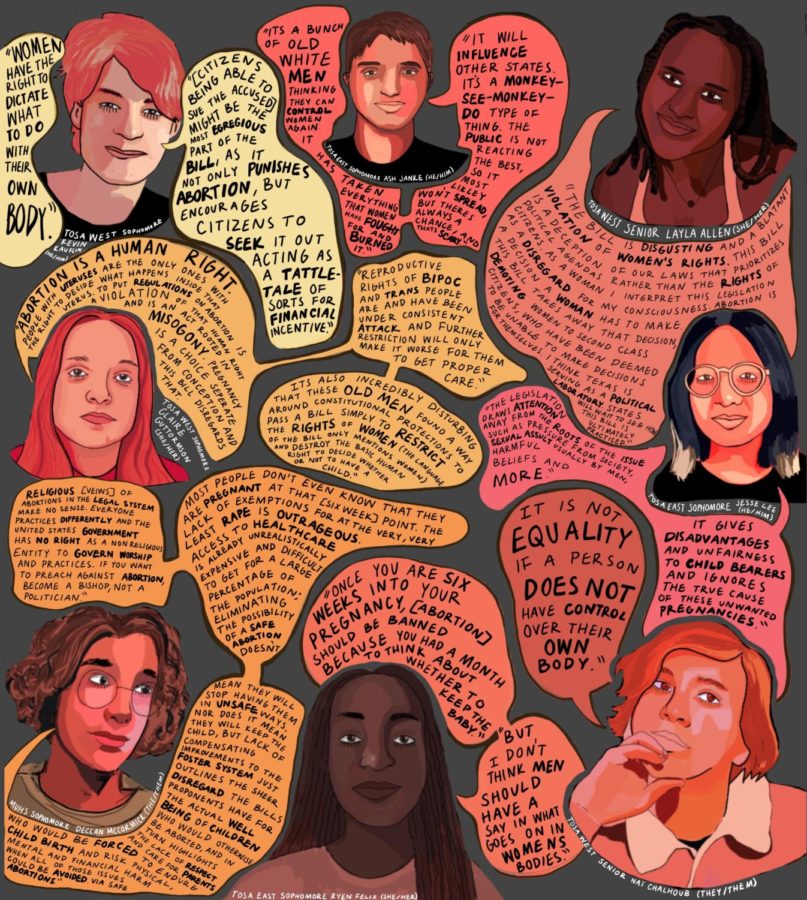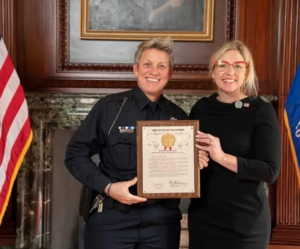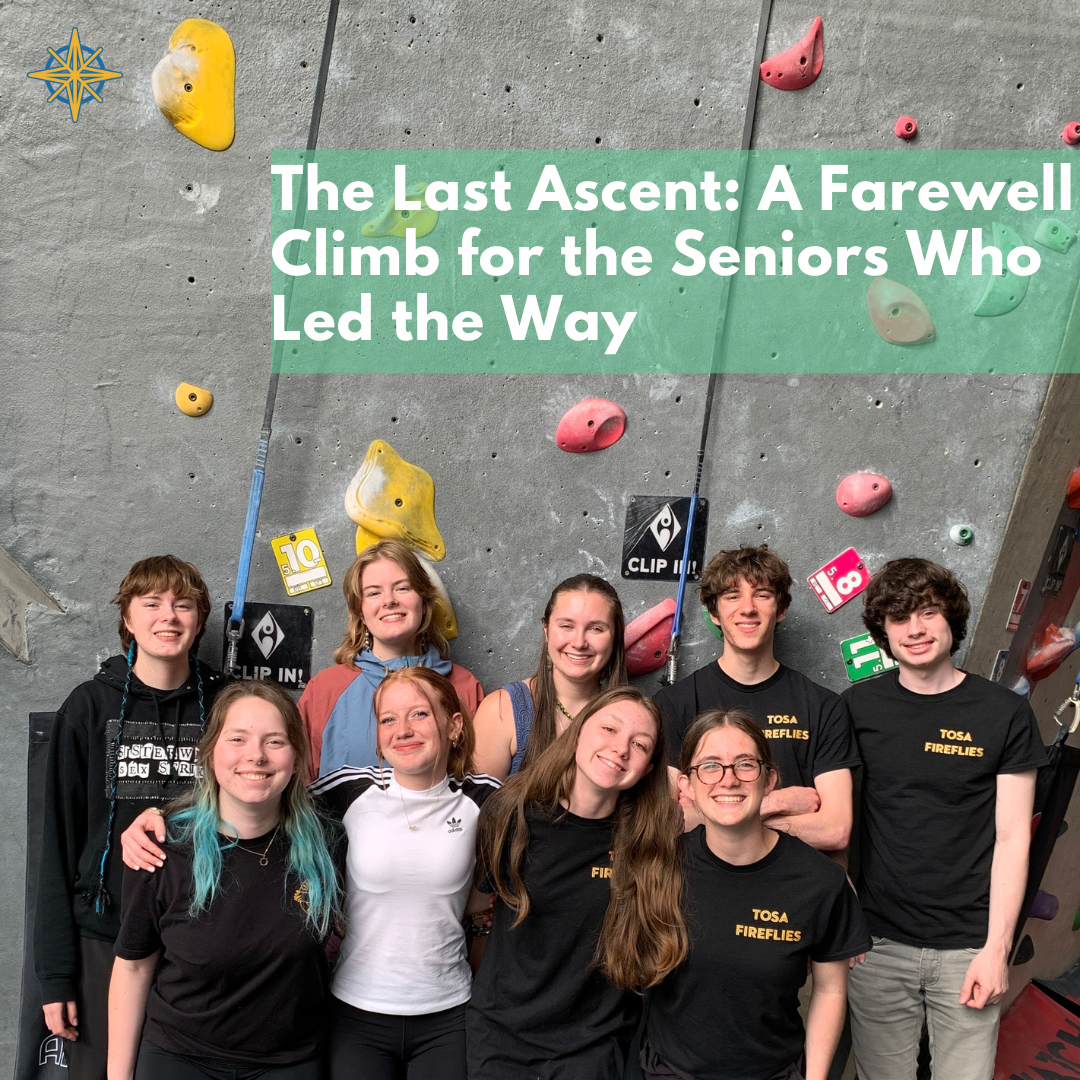Wisconsin Teens Speak Out About Abortion
Wisconsin Teen’s Speak Out About Abortion graphic by Evelyn Skyberg Greer
December 20, 2021
The 1973 landmark decision of Roe v Wade states that the Constitution of the United States protects a pregnant person’s liberty to choose to have an abortion without excessive government restriction. However since this decision was implemented, many anti-abortion lobbyists and politicians have been attempting to further remove abortion rights and protections.
As abortion rights across the country are targeted by state legislation, Wisconsin teens have something to say.
“Abortion is a human right. People with uteruses are the only ones with the right to decide what happens inside that uterus. To put regulations on abortion is a violation of that human right and an act rooted in misogyny,” said Tosa West Sophomore Claire Guttormson. “Reproductive rights of BIPOC and trans people are and have been under constant attack and further restrictions will only make it worse for them to get proper care.”
The Texas abortion bill, which took effect on September 1st 2021, is the first time a state has successfully imposed a six week abortion ban since Roe v. Wade. This law says that any pregnancy in which a heartbeat is detected cannot be aborted. That effectively means that if you’re six weeks pregnant, you cannot have an abortion in Texas, because that is around the time when most fetal cardiac activity can be detected.
Guttormson finds this bill sickening.
“Pregnancy is a choice separate from conception and this bill disregards that. It’s also incredibly disturbing that these old men found a way around constitutional protections to pass a bill simply to restrict the rights of women (the language of the bill only mentions women) and destroy the basic human right a person has to decide whether or not they want to have a child,” she said.
The law makes no exceptions for rape, sexual abuse, or incest. The law also incentives the public to police abortions. It allows people to sue abortion providers or anyone else they suspect is “aiding and abetting” abortions after that six-week mark.
“[Citizens being able to sue the accused] might be the most egregious part of the bill, as it punishes abortion, but also encourages citizens to seek it out acting as a tattle-tale of sorts for financial incentive,” said Tosa West Sophomore Kevin Kauflin. “Women have the right to dictate what to do with their own body.”
Marquette University High School Sophomore Declan McCormick also disagrees with the bill’s limitations.
“Most people don’t even know they’re pregnant at that [six week] point, the lack of exemptions for at the very, very least rape is outrageous, not to mention the forcing upon of religious beliefs and invasion of personal freedoms,” they said. “The language used in the bill makes it very evident that an attempt is being made to not only prevent abortions, but to criminalize them as well, which is so stupid.”
Tosa West Sophomore Ryen Felix has a different opinion on the matter.
“Once you are six weeks pregnant [abortion] should be banned because you had a month to think about whether to keep the baby,” she said.
Although Felix feels that six weeks is enough time to make a decision, she feels only women should be in charge of making that choice. “I don’t think that men should have a say in what goes on in women’s bodies,” she said.
About two weeks from conception and four weeks from their last period is when someone could potentially test pregnant after missing the start of their new period. However, unless the person is intending to get pregnant or closely monitoring their period, it is not likely that they will know they’re pregnant in the six week time restriction. For people with irregular periods it is even more difficult to determine gestational age or period lateness. According to a study from 2017 by the NBCI, “Among all pregnancies reported, gestational age at time of pregnancy awareness was 5.5 weeks.”
There are also several factors that further restrain the 6 week time window of termination. For example, if a person does not get a pregnancy test until about a week after they miss their period. Under previous Texas law, an ultrasound must also be preformed 24 hours before a person receives an abortion, restraining the time window even more.
This bill is the most restrictive abortion law in the country and is in stark contrast to Roe v. Wade, the 1973 landmark decision legalizing abortion nationwide.
“It’s a bunch of old white men thinking that they can control women again. It has taken everything that women have fought for and burned it,” said Tosa East Sophomore Ash Janke.
Janke worries that the bill will influence other state abortion restrictions.
“It’s a monkey-see-monkey-do type of thing. The public is not reacting the best, so it most likely won’t spread, but there’s always a chance, and that’s scary,” he said.
Wauwatosa West Senior Layla Allen also viewed the bill as being influential to other state legislation.
“I think that Texas is serving as a political laboratory. States with similar views will wait to see how this bill is ultimately practiced,” she said.
Allen sees the bill as being a step in the wrong direction when it comes to women’s equality.
“I think the bill is disgusting and a blatant violation of women’s rights. This bill is a deception of our laws that prioritized political agendas rather than the rights of citizens,” she said. “As a woman I interpret this legislation as a disregard for my consciousness. Abortion is a decision a women has to make. This bill takes away that decision, demoting women to second class citizens, who have been deemed to be unable to make decisions for themselves.”
Allen also worries about the effect the bill will have on citizens access to abortion.
“I think this puts citizens in need of an abortion and abortion clinics in a very difficult position. That will ultimately impact many people’s lives and create more animosity among citizens.”
Marquette University High School Sophomore Declan McCormick also has concerns about abortion access.
“Access to healthcare is already unrealistically expensive and difficult to get for a large percentage of the population,” they said. “Eliminating the possibility of safe abortion doesn’t mean people will stop having them in unsafe or unofficial ways nor does it mean that they will keep the child, but the lack of compensating improvements to the foster system, which is already outdated and in need of improvement on its own, just outlines the sheer disregard the bill’s proponents have for the actual well being of children who would otherwise be aborted, and in turn highlights the lack of respect and care for the parents who would be forced to endure childbirth and risk physical, mental, and financial harm when all of those issues could be avoided via a safe abortion.”
McCormick is opposed to the idea of the church being involved in these decisions.
“Religious [views] of abortions in the legal system make no sense,” they said. “Everyone practices differently and the United States government has no right as a nonreligious entity to govern worship and practices. If you want to preach against abortion, become a bishop, not a politician.”
The Supreme Court is currently ruling to decide if a bill similar to that passed in Texas will pass in Mississippi. This proposed bill criminalizes abortion after 15 weeks and will effectively challenge Roe v Wade.
“I think that it is extremely unfair, especially to those who haven’t planned on pregnancy or are unavailable to have and care for a child. It strips people of their rights to their own bodies,” said Tosa East Sophomore Jesse Lee. “Abiding by this legislation means restricting what people are allowed to do with their bodies, which is restricting freedom. It draws attention away from the real roots of the issue, such as peer pressure from society, sexual assault, harmful beliefs, and more. It gives disadvantages and unfairness to child bearers and ignores the causes of these unwanted pregnancies,” he said.
Tosa West Senior Naï Chalhoub also feels that these restrictions are harmful.
“It isn’t equality if a person doesn’t have control over their own body,” they said. “It is the woman’s right to choose what she does with her body.”
Tosa West Sophomore Claire Guttormson hopes that the youth can have an impact on the decisions that are made.
“I think that as a young person I have the ability to put lasting pressure on my representatives and political leaders to protect my rights,” she said. “People should never be denied the right to control their own bodies, and that means that they should never be denied the right to an abortion. This is an issue among many that will shape my future. Due to my youth I have the energy and the determination to continue to fight for that future.”















